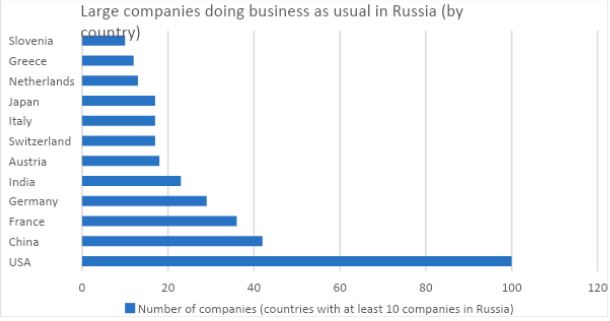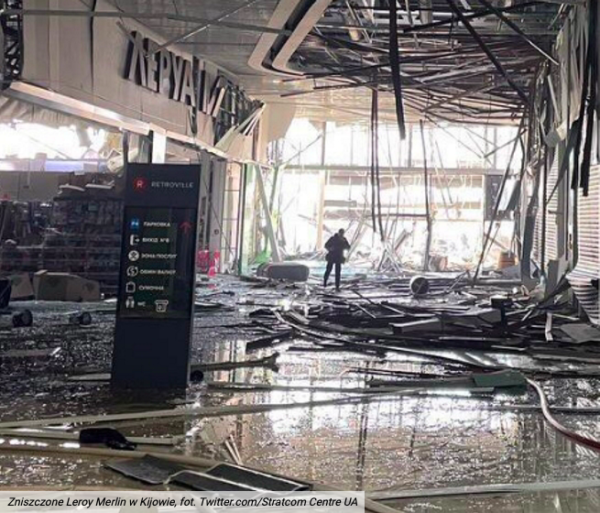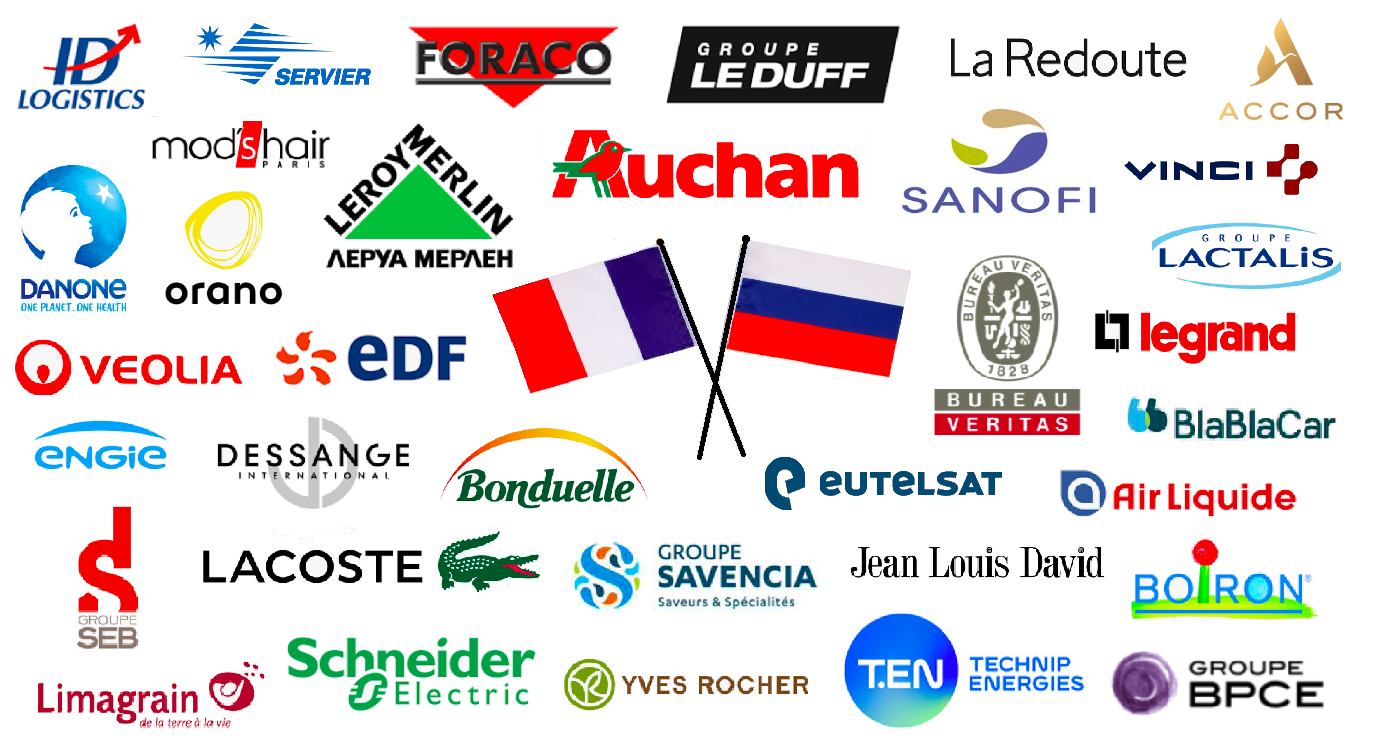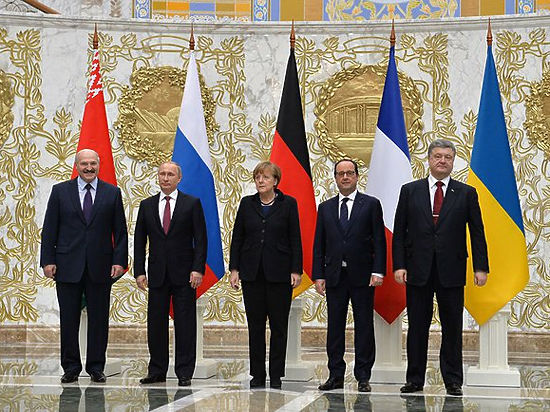Most of the 1,200 French companies have remained in Russia; some expand their business. French companies are collectively the single biggest foreign employer in Russia, with about 160,000 employees. They pay billions of dollars in taxes to the Russian Federation every year. But most French companies refuse to leave Russia, while some of their competitors have already left.
1,200 French companies operated in Russia before 24 February 2022. Following the Russian invasion of Ukraine, in a speech to the French parliament in late March, President Zelenskyy asked French companies to suspend business in Russia. On the same evening, Renault announced that it was withdrawing from Russia. A number of other big companies also ceased doing business in Russia, including Société Générale, L’Oreal, LVMH and, most recently, L’Occitane.
However, most French companies remain in Russia.
The main player is Association Familiale Mulliez (AFM), a holding company for one of France’s richest families: Mulliez. AFM employs 77,500 people in Russia through ownership of companies such as Auchan (86% ownership), Leroy Merlin and Decathlon. Interestingly, Decathlon has suspended its operations in Russia, while Auchan and Leroy Merlin refuse to do so.
Among major foreign companies that continue business activities in Russia, 36 out of 434 companies come from France. French companies are the slowest to withdraw from Russia compared with other European companies (see figure below).

How did French companies respond to Russia’s invasion?
French companies continue business as usual at a time when some of their key competitors have already suspended their business in Russia. For example, Sweden’s IKEA and Germany’s OBI closed their homeware stores in Russia, while Leroy Merlin stays. Several utilities companies like UK’s Centrica left or suspended operations, but France’s EDF, Engie and Veolia stay.
Some French companies declare that they have ‘scaled back’ their activities or ‘halted new investments’, but these gestures appear to be driven mostly by publicity concerns.
For example, the oil and gas giant Total Energies claimed to have stopped investment in new projects in Russia and to stop oil imports, but they will continue importing Russian oil until the end of the year and they have not curtailed any of their activities in Russia – which include a 19.4% stake in Novatek, Russia’s largest LNG producer. Bureau Veritas has scaled back activities in Russia related to sectors affected by international sanctions (shipping and airlines) but continues all other business activities. In reality, these companies continue doing business as usual in Russia.
Why are French companies staying in Russia?
Several French companies such as Auchan have stated that they are staying in Russia for the benefit of their employees and customers. It may sound nice that companies care about their employees, but the argument is difficult to believe when you consider their past actions. Two years ago, Auchan had few concerns about laying off 1,475 employees in France as part of a corporate "reorganization plan."
There can be no doubt that French companies care about their profits in Russia. Indeed, some French companies are hoping to benefit from the departure of international competitors by expanding their business in Russia. For example, Leroy Merlin says that their sales in Russia have increased following the withdrawal of their competitors and that they now have plans to increase product variety at their stores.
A withdrawal from Russia can undoubtedly be painful for company owners. Leaving Russia may cost Renault and Société Générale billions of euros. But companies from other countries are also worried about their profits. Companies such as Shell and JP Morgan will also lose billions.
There is one compelling reason why French companies remain in Russia, while others are leaving. The French political and business elite, including President Emmanuel Macron and presidential contender Marie Le Pen, failed to call for French businesses to withdraw. In early March, Macron met with 15 large French companies such as Auchan and Airbus, telling them “not to leave Russia,” according to the French daily Le Figaro.
Geoffroy Roux de Bezieux, president of France’s employer federation MEDEF, was quoted by Reuters as saying:
“We follow the recommendations of our government which is not asking us (companies) to close down. We have a responsibility to help feed the Russian consumer and as employers, a responsibility to pay the staff.”
But, what responsibility do companies have towards Ukrainian consumers and employees?

How socially responsible are French companies?
Corporate Social Responsibility (CSR) is not a new concept in France. At the turn of the 21st
century, France widely embraced CSR. In 2001, France was the first European country to legislate for listed companies to introduce CSR/sustainability reports. French companies have embraced ethical codes of conduct, UN principles, human rights, environmental management, and other CSR/sustainability concerns.
Out of the 36 large French companies that refuse to leave Russia, 28 companies publish a CSR/sustainability report. Indeed, some of these companies are recognized as France’s leaders in terms of social responsibility. In the 2021 ESG rankings, Veolia was ranked as the fifth most socially responsible company in France, Legrand was at no.22, and Bureau Veritas at no.23. All of these companies seem to believe that the Russian invasion has nothing to do with social responsibility.
However, French companies should withdraw from Russia for three key reasons:
- It is not socially responsible to provide huge amounts of taxes to the Russian state when you know that this money fuels horrific crimes committed by Russian troops in Ukraine. French companies collectively pay billions of dollars in taxes to the Russian Federation every year. Leroy Merlin alone paid $335 million to the Russian Federation in 2020; Auchan paid an undisclosed amount of taxes on revenues of over $3.5 billion last year.
- By staying in Russia, French companies provide legitimacy to the Russian regime and Russia’s invasion of Ukraine. Notably, Bureau Veritas actually provides credibility to Russian companies as part of their business. Bureau Veritas provides certifications such as ISO14001 for Russian companies to attest to their environmental management standards and other social responsibility concerns; it also acts as an assurance provider for social responsibility reports of companies.
- By failing to consider the implications of human rights abuses in Ukraine, French companies violate their own CSR principles – given that many of them profess to support human rights. They also breach French government legislation on human rights: Corporate Duty of Vigilance Law of 2017.
The Corporate Duty of Vigilance Law introduced mandatory human rights due diligence for large companies. The law spells out that French companies with 5,000+ employees must identify and analyze the risks of human rights violations in connection with their operations, they must take action to mitigate those risks, they must discuss their vigilance plan with stakeholders and they must report on the measures taken.
There are currently no penalties for non-compliance, which is probably why French companies simply ignored the 2017 law when Russia invaded Ukraine. Yet the human rights duties of French companies are clearly spelled out and these companies are in breach of them.
Finally, what will it take for French companies to fully accept their social responsibilities?
List of the largest French companies remaining in Russia
| Company | Business activities in Russia | Industry sector |
| Accor | suspended new investments/development, but continues with existing activities | Hotels and hospitality |
| Air Liquide | suspended new investments and does not serve clients affected by sanctions, but continues with most existing activities | Industrial gases & services |
| Auchan-Retail | continues with existing activities | Supermarket retail |
| BlaBlaCar | stopped new investment but continues with existing activities | Online carpooling platform |
| Boiron | suspended new investments and stopped clinical trials, but continues with existing activities | Health care |
| Bonduelle | continues with existing activities | Food processing |
| Bureau Veritas | Suspended work related to clients affected by sanctions (shipping, airlines), but continues with most existing activities | Certification services |
| Danone | suspended new investments, but continues with existing activities | Food processing |
| Dessange | continues with existing activities | Hair/beauty salons |
| EDF | continues with existing activities | Utilities/Electricity |
| Engie | halted new investments, but continues with existing activities | Utilities/Electricity & gas |
| Eutelsat | continues with existing activities | Satellite TV services |
| Foraco | continues with existing activities | Mineral drilling services |
| Groupe BPCE | Halted financing of new projects, but continues with existing activities | Financial/Banking |
| Groupe Le Duff | continues with existing activities | Restaurants and bakeries |
| Groupe Limagrain | suspended a project to build a seed factory, but continues with existing activities | Cereal & seed production |
| Groupe Savencia | continues with existing activities | Food/Agribusiness |
| Groupe Seb | suspended new investments, but continues with existing activities | Manufacturing/Appliances |
| ID Logistics | suspended new investment in Russia, but continues with existing activities | Logistics services |
| Jean-Louis David | continues with existing activities | Hair salons |
| La Redoute | continues with existing activities | Fashion and homeware |
| Lacoste | continues with existing activities | Fashion/perfume/watches |
| LACTALIS | continues with existing activities | Dairy products |
| Legrand | continues with existing activities | Electrical devices |
| Leroy Merlin | continues with existing activities | Home improvement/garden |
| Mod's Hair | continues with existing activities | Hair salons |
| Orano | continues with existing activities | Nuclear power/renewables |
| Saint-Gobain | suspended exports and imports, but continues with existing operations | Industrials |
| Sanofi | halted marketing and clinical trials, but continues with existing activities | Pharmaceuticals |
| Schneider Electric | stopped new investments and project orders, but continues with existing activities | Electrical equipment |
| Servier | continues with existing activities | Pharmaceuticals |
| Technip Energies | no new business, but continues with existing activities | Engineering and services |
| Total Energies | no longer provides capital for new projects in Russia, claimed to stop oil imports, but continues with existing projects and import of oil | Oil and gas |
| Veolia | continues with existing activities | Utilities/Water |
| Vinci SA | continues with existing activities | Construction/engineering |
| Yves Rocher | suspended new investments/development, but continues with existing activities | Cosmetics and beauty care |
Adapted from Yale CELI List of Companies, as of 19 April, 2022
Related:
- How Western sanctions cripple Russia’s war machine: no modern tanks, navigation systems or drones
- International sanctions slam Russia’s finance, economy, culture, sports: a list
- Academic publishers continue “business as usual” in Russia
- Germany exports dual-use products to Russia despite EU sanctions, beefing up Russian military
- Rebecca Harms: Germany and France should stop supporting Russia’s unconditional return to PACE
- The World Speaks Out Against French-Russian Mistral Deal
- Delegation of French MPs to visit occupied Crimea. Again.





